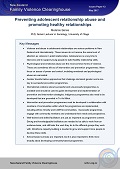 Issues Paper 12, May 2017
Issues Paper 12, May 2017
Author: Melanie Beres1, PhD
1 Senior Lecturer in Sociology, University of Otago
Downloads
Key messages
- Violence and abuse in adolescent relationships are serious problems in New Zealand and internationally. These issues do not receive the same level of attention as violence in adult relationships. Adolescence is a key time to intervene and to support young people to build healthy relationship skills.
- Psychological and emotional abuse are the most common forms of violence. These are sometimes left out of intervention and prevention programmes. More focus on issues of power and control, including emotional and psychological abuse are warranted.
- Gender transformative approaches that challenge dominant gender norms are key to successful prevention programmes.
- International evidence about successful and unsuccessful programmes is available and should be used to guide development and implementation of prevention and intervention strategies. Indigenous programmes also need to be developed that are grounded in Te Ao Māori.
- Intervention and prevention programmes must be developed in collaboration with members of communities within which the programmes are implemented, including ethnic minority and LGBTIQ communities. Successful programmes engage with community members and understand their needs and perspectives.
- Well-trained and skilled facilitators are just as important as programme content. Strong and knowledgeable facilitators are needed to be able to work from an evidence-base, and still tailor the work they do to the different groups they work with. Workforce capacity building is needed to grow and support more people to develop these skills.
- School-based curricula are important, but it is also important to think more broadly about developing community-based programmes.
Recommended citation
Beres, M. (2017). Preventing adolescent relationship abuse and promoting healthy relationships. Auckland, New Zealand: New Zealand Family Violence Clearinghouse, University of Auckland.
ISSN: 2253-3222, published online only.
Feedback
The Clearinghouse welcomes your feedback. Please email us - we would love to hear your comments on this issues paper.


